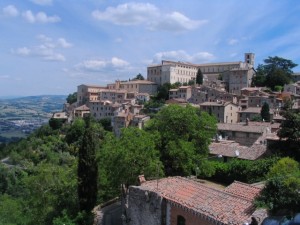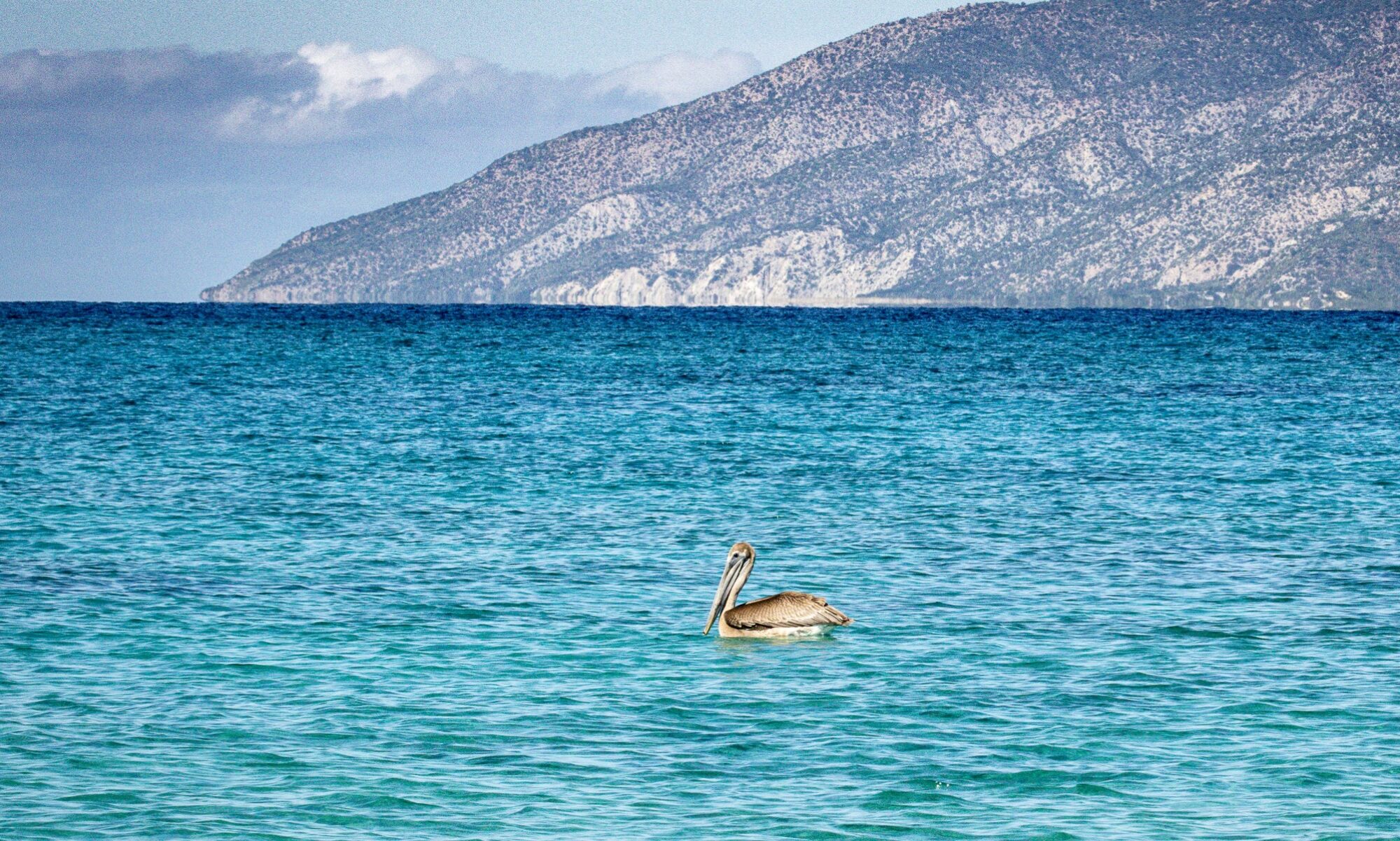
We’ve completed our cycle trip, and proceed to Norcia for a week of hiking in the lovely surrounding mountains. Our final day’s ride from Trevi to Spoleto was a cruiser, and we arrived mid-day. The instructions to Hotel Charleston were explicit, and we found Spoleto to be a bustling community without the attitude of Perugia that seems to accompany a capitol city. Our friends John and Susan had arrived the day before, and after connecting with them we looked around town.
Spoleto hosts an annual festival from mid-June that lasts into the summer. The city is completing a major spring cleaning, and when the scaffolding and tarps are removed from the dozens of buildings around town, it’ll shine. We found a wonderful restaurant near city center, and ate a light meal of melons with prosciutto and strongozze Spolotena (the thickish pasta with a spicy tomato sauce). There was a convention of Doctors in town, and we observed them eating a fixed meal complemented with chicory sautéed in oil with lemon juice. So we just had to taste that, too. It’s been that kind of a trip.
In fact, taking each event as they come has proven time and again to reap wonders. Our previous stay was in the walled town of Trevi, and following a 5 Km. uphill ride into this hill-top town (we should know by now!), we were exhausted. We cycled right up to our hotel (Hotel Trevi), parked our bikes, and checked in.
The Hotel Trevi was a cute little place with rooms overlooking the entire region. From our window we could see Spoleto (our final day’s destination) in the distance, its massive fort illuminated by the setting sun. The interior of the hotel was painted by the the owners in tastefully-selected frescoed scenes. She was formerly an art restorer until the chemicals forced her to change careers. A rather boring salon outside our room’s door was converted into a courtyard with “streets” wandering off in an exercise of perspective. The room featured a skylight which created a naturally-lit atmosphere that made us feel we were in an actual piazza. Downstairs, there were arches in the ceiling with stucco rising up to the bricked vaults. She had cleverly painted grape or ivy leaves meandering along the stuccoed walls, and where they met the stone arches she had crafted ceramic leaves that continued the concept in three-dimension along the bricks’ surface. A very talented woman, she graciously whiled away the afternoon with us. Our dinner was included that evening, but we were farmed out to another restaurant and told to arrive at 7:30. After meandering around the little town with its interesting red-stoned pathways and roads, we arrived for dinner. It was really strange, but for the first time we felt like strangers. Our server was really harried for some reason, looked like he’d just woke up, and hardly paid us the time of day. We realized how much for granted we take interacting with restaurant staff and how much we learn about local foods, wines, and the practice the vocabulary needed to maximize those experiences.
Following a “fixed” (tourist) meal where we were not permitted any choices or options, we returned to our hotel and when asked by the owner, related our experience. He was shocked that we weren’t even offered a wine list or advised what wines would best compliment our meal (of which we didn’t have a clue). He was genuinely concerned because there are only two restaurants worth mentioning in Trevi, and when circumstances require him relying on culinary support (as was the case with us), he needs the assurance that his hotel’s guests would be treated well.
He then invited us to join him in a drink of a special desert wine, which we accepted both because of his sincere disappointment in our experience and because he’s also a professional wine judge (The Hotel Trevi also hosts the Universita Di Scienze Gastronomiche of which he’s the lone professor). Our conversation switched into into English, and Hettore presented an hour-long discourse on the history, production, consumption, and marketing of these wonderful late-harvest grapes. The amber wine left a fragrant residue on the stemmed glass as he gracefully swirled it around. This wine is best enjoyed at room temperature, and he generally lets it breath for an hour or so. Being a little more impatient, we waited about 10 minutes while we listened to his lecture (it was admittedly a bit painful waiting). Finally he swirled again, inhaled deeply, and we consumed the smoothest and freshest “sweet” wine I’ve ever had. It had the essence of a peach or apricot nectar although the base was indeed grape. We swirled, inhaled, sipped for another hour or so, and effectively forgot our pedestrian meal and the waiter who needed an attitude shift. I guess whining does lead to wining.
